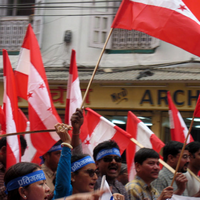THIMPU, Bhutan -- Nepal's Prime Minister Madhav Kumar Nepal returned home from the 16th South Asian Association for Regional Cooperation (SAARC) summit in Bhutan on April 30 to face a political crisis in his landlocked Himalayan nation. On May 1, the country's former prime minister, the Maoist leader Pushpa Kamal Dahal (popularly known as Prachanda), began an indefinite general strike aimed at bringing down Kumar Nepal's government.
The ostensible reason was the latter's almost-certain inability to meet a looming May 28 deadline for a new constitution, part of the 2006 peace agreement that ended a decade-long Maoist insurgency. But a source in Nepal's foreign ministry told World Politics Review that Prachanda had warned the Nepalese interior minister in a phone conversation on April 29 that he was preparing to capture power.
While the situation in Nepal was not on the agenda of the SAARC summit in Thimphu, Indian Prime Minister Manmohan Singh did meet his Nepalese counterpart on the sidelines and assured him of New Delhi's support in the current crisis.

